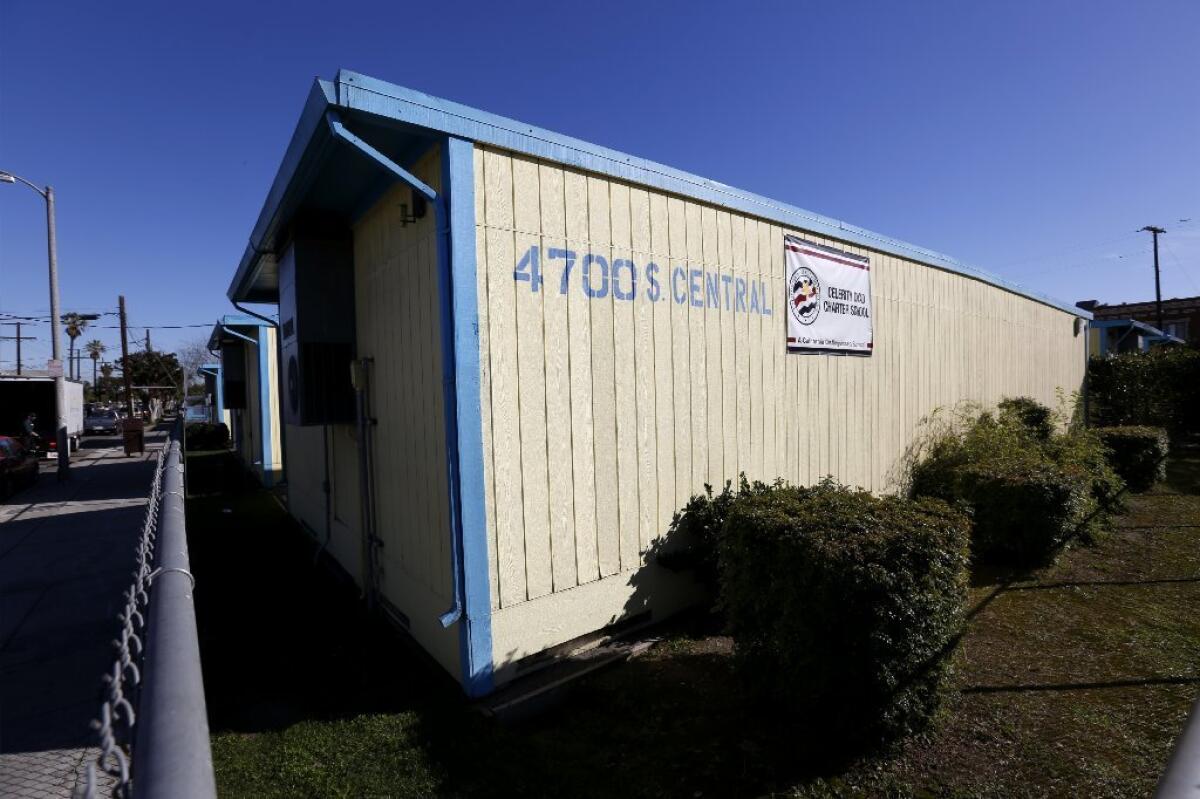Under federal investigation, Celerity charter schools are in danger of losing their accreditation

- Share via
Los Angeles charter schools that are part of a network currently under federal investigation have been put on notice that their accreditation is in jeopardy.
Seven schools run by the nonprofit Celerity Educational Group are spread across the Los Angeles Unified School District. Six carry the seal of approval of the Western Assn. of Schools and Colleges, commonly known by its acronym WASC, an accrediting agency recognized by the U.S. Department of Education.
On Wednesday, the association sent Celerity Chief Executive Grace Canada a letter saying that after a preliminary investigation, it had found the network to be in violation of several of the agency’s policies. It demanded that Celerity provide evidence to show “why the accreditation status of all CEG schools should not be withheld,” according to the letter signed by WASC President Fred Van Leuven.
Founded by a former L.A. Unified employee, Celerity Educational Group has been operating charter schools in Los Angeles for over a decade. In recent years, it has gone national, expanding into Ohio and Florida — where it struggled to gain a foothold and eventually withdrew — and Louisiana, where it still operates four charter schools today.
But after years of relatively little scrutiny, the charter school network is now the subject of two investigations, one by the inspector general of L.A. Unified, who has been looking into allegations of misuse of public funds, and another by federal agencies including the U.S. Department of Education.
In January, agents from the Department of Homeland Security, the FBI and other agencies raided Celerity’s offices as well as the headquarters of a related nonprofit, Celerity Global Development, and the home of the organization’s founder, Vielka McFarlane.
In its review of the group’s financial records, The Times documented years of questionable spending by Celerity’s leaders and potential conflicts of interest.
No one at Celerity, including McFarlane, has been charged with a crime stemming from the schools’ operations. Celerity’s leaders have repeatedly defended the network’s management and financial decisions as perfectly legal and typical of charter schools, which are privately managed but publicly funded.
In its letter to Celerity, WASC criticized the network for not alerting the association to the federal raid and investigation in a “timely” manner. The association’s policies require schools to report any “substantive changes” within 30 days.
It also questioned the organization’s ethics and its commitment to fully disclosing information about its operations. Included in WASC’s letter was a list of requests for detailed information about Celerity’s finances and McFarlane’s involvement in the charter school network. It called on Celerity to have an independent audit done to determine if the organization is financially stable and following state and federal laws.
“Based on the information available, the Commission believes that the integrity of the CEG Schools have been seriously undermined,” the letter said.
WASC gave Celerity until June 2 to provide the requested information. Van Leuven did not respond to requests for comment.
Celerity says that it did notify the association of the federal investigation and provided The Times with a letter dated Jan. 30 — less than a week after the raid — in which it told WASC that federal agents had seized documents from its offices.
“As soon as we learned of the beginning of this investigation, we notified WASC of that investigation and followed up with calls and information responsive to WASC’s concerns — including the January 30th correspondence,” the network said in a written statement provided by a public relations consultant. “We are continuing that effort, and will work with WASC and its concerns to ensure that our schools are recognized for the high quality education they provide, not rumors and innuendo.”
Accreditation is important for high schools, as many colleges, universities and scholarship programs prefer or require students to have diplomas from accredited high schools. For K-8 schools such as those run by Celerity, a loss of accreditation has no immediate ramifications. Getting the stamp of approval from an outside agency is optional.
“It’s basically just a status thing,” said Robert Perry, the administrative coordinator for L.A. Unified’s charter schools division. But the school district does take accreditation into consideration when deciding whether to renew a charter school for another five-year term. “It’s a sign that something must be wrong for WASC to pull that. That’s a pretty rare thing,” Perry said. “It draws an unwanted spotlight on your school.”
Despite the questions surrounding Celerity’s operations, the network is poised to open two new charter schools next year. And on Friday, the California Department of Education issued a recommendation that the state Board of Education renew two of Celerity’s existing schools, which L.A. Unified had refused to grant another five-year term. The recommendation came with conditions that Celerity agree to turn over more information about its inner workings to state officials.
To read the article in Spanish, click here
Twitter: @annamphillips
UPDATES:
8:35 p.m.: This article was updated to include the California Department of Education’s recommendation on Friday that two Celerity schools be renewed.
This article was originally published at 5:50 p.m.
More to Read
Sign up for Essential California
The most important California stories and recommendations in your inbox every morning.
You may occasionally receive promotional content from the Los Angeles Times.














